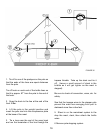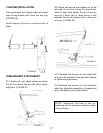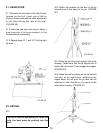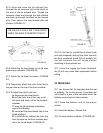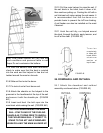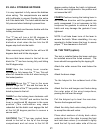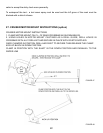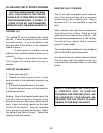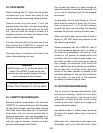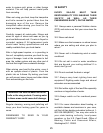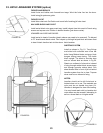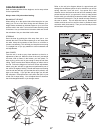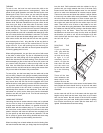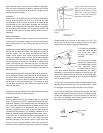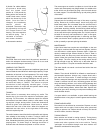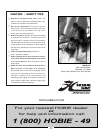
29. TRAILERING
When trailering the 21, follow all instructions
included with your trailer and obey all the
relevant state laws concerning trailering boats.
Remove each wing and insert it into the
opposite side of the boat. The right wing will go
into the left hull and the left wing into the right
hull. This will allow the wings to remain in a
straight-up position to reduce the beam of the
boat to a lawful trailering width.
Tie down the mast both in the front and in the
back (below the COMPTIP) to prevent the
mast from coming loose during transport.
Securely strap or tie down your boat to the
trailer before starting your way.
WARNING:
NEVER trailer your 21 so that the plastic luff
track of the COMPTIP rests on the rear
crossbar or mast support because this may
result in damage to the luff track.
WARNING: DO NOT USE WINCH LINE
FROM YOUR TRAILER TO TIE THE MAST.
30. COMPTIP MAINTENANCE
Because surface contamination can allow the
COMPTIP to conduct electricity, the fiberglass
tip should be carefully and thoroughly cleaned
with fresh water after each use. In the event
fresh water will not remove surface film or
other contamination, use soap and water only.
DO NOT attempt to clean the COMPTIP mast
with any type of solvent. Acetone or other
solvents will damage the luff track.
Do not leave the mast tip in direct sunlight for
extended periods. Cover the tip whenever it is
not in use so ultraviolet rays will not degrade
the surface.
Always trailer the luff track facing up. Do not
allow mast tie-downs to touch the luff track.
Use a minimum of 1 1/2" of soft padding
around the mast tip and place the padding
between the luff track and any tie-down lines.
When storing the mast, be sure the luff track is
facing up. DO NOT apply any pressure to the
luff track during storage.
Please remember that the COMPTIP mast is
not total guarantee against injury or death in
the event of a mast/power line contact. If the
surface or luff groove is contaminated with
moisture, salt, dirt or other foreign matter, or if
the mast touches a line carrying extremely
high voltage, an electrical injury could still
occur. Additionally, the protection is confined to
the tip area only. A contact of the aluminum
portion of the mast, shrouds or forestay is still
extremely dangerous. The only sure protection
for any sailor, on any boat, is the complete
avoidance of electrical power lines.
31. ROUTINE MAINTENANCE
The 21 must be tightened periodically. After
sailing and trailering, inspect all nuts, bolts
and, most importantly, the shrouds and
gudgeons to make sure that these critical
elements are fitted tightly and properly to
insure safe performance.
Use beach wheels or dollies when launching
the boat off a beach. Never drag it over sand
or rocks.
After each sail, especially a salt water sail,
thoroughly rinse your boat with fresh, clean
24



